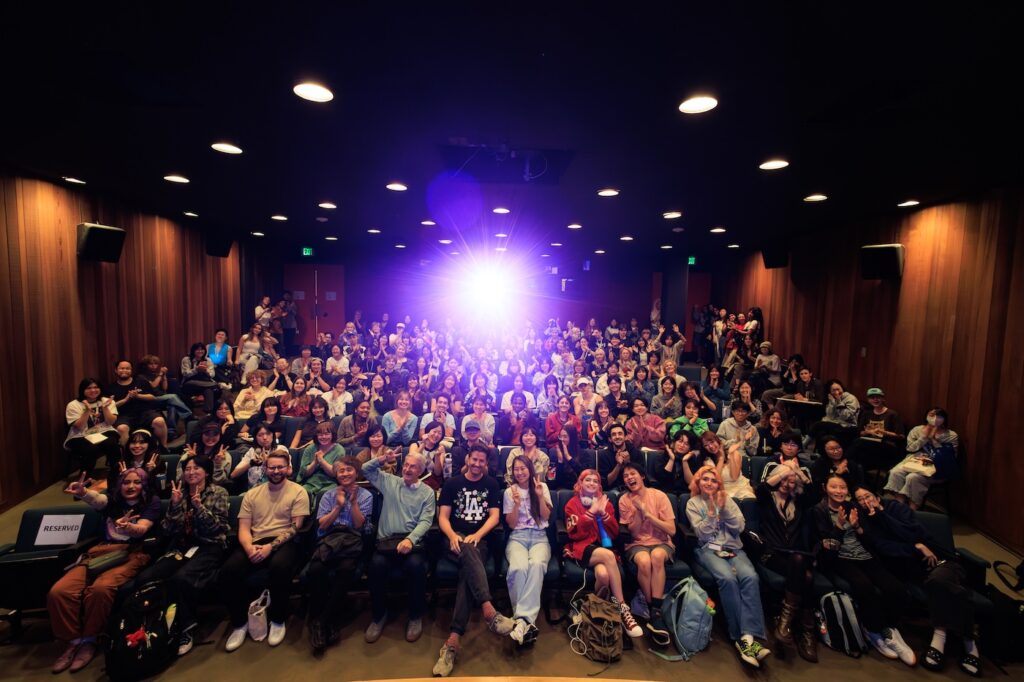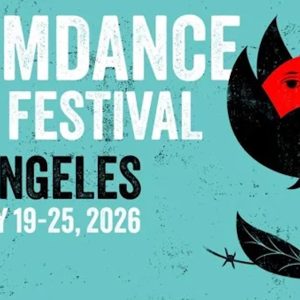Last week, the Character Animation Program kicked off its 2025-26 Friday Night Talk series with a panel discussion featuring the directors of one of the hottest films of the year: KPop Demon Hunters.
Maggie Kang and Chris Appelhans—the minds behind Sony Pictures Animation’s musical juggernaut—regaled a packed Bijou Theater with behind-the-scenes stories on Sept. 12, answering thoughtful questions from moderators and Character Animation 2025 alums Asher Borison, Anya Butler, and Rita Chen.
Produced in partnership with Netflix, KPop Demon Hunters has become a worldwide cultural phenomenon, recently earning the mantle of the most popular Netflix film of all time with more than 314 million views. The film has also proven it’s a big-screen draw as it topped the North American weekend box office on Aug. 23-24 for special sing-along screenings.
The innovative film focuses on fictional Kpop girl group Huntr/x, who secretly work as demon hunters in their spare time. Rumi, Mira, and Zoey use their music to reinforce the Honmoon—a protective layer around the world—in order to prevent demons from invading and stealing human souls.


This passion project, which took seven years to make from the studio pitch meeting to the screen, is based on Kang’s desire to see “an animated project that celebrates Korean culture.” Kang, who was born in Seoul, Korea, and raised in Toronto, wanted to make a film that reflected her own upbringing.
The Sheridan College alum began her career at DreamWorks Animation as a story artist on various projects including the Puss In Boots franchise and The Croods: A New Age. Kang insisted on creating an animated film that included female superheroes and characters and stories from K-dramas. She described the film, in its essence, as “world-building, but through a Korean lens.”
Fellow director Appelhans, who wrote and directed Sony Pictures Animation’s 2021 animated feature film Wish Dragon, also released on Netflix, started his career as a concept artist on The Princess and the Frog, The Fantastic Mr. Fox, and Monster House. He earned an Annie Award nomination for his work in production design on the stop-motion feature Coraline.
When starting the project, Kang and Appelhans told the Bijou audience that they had “accidental synergy” and immediately bonded over music and fashion. Appelhans also noted that they agreed on the use of humor, “Comedy could be used in a way to hide deeper storytelling.”
Kang told the mostly undergraduate audience that directing can be difficult, especially with all the moving pieces of a big budget studio project. Luckily the two directors had each other to lean on and to complain to. “We shared a brain,” Kang semi-joked. “It’s an advantage when having a directing partner.”
During the panel discussion, Appelhans and Kang revealed that while Kpop groups are usually larger ensembles, they compromised on three main characters because of time and budget. But they also found it easier to play with a triangle dynamic among the girls. Kang also mentioned that back in her day, the Kpop group S.E.S. was a trio (so there’s precedence). They also revealed that each of the five Saja Boys (a rival demon boy band) share the same body, except for the muscular Abby Saja, who they bulked up 20% more.
“As a director, everything had to be 100% before we let it go,” Kang said. “Every one of those choices [in the film] were deliberate.”
One of the questions asked by the moderators focused on the film’s music and the songwriting. The directors described the process as “grueling” as they wanted the songs to be Kpop tunes that told and forwarded the story at the same time. “‘Golden’ is doing so many things at the same time,” Appelhans said. The song not only reveals Rumi’s inner thoughts, but also becomes an inspirational anthem simultaneously. Plus, bits of Korean phrases were mixed in with the English lyrics. It was a tall order for the songwriting team.
The hard work has paid off as the soundtrack for this nontraditional musical is breaking records—landing at No. 1 on the Billboard 200 albums chart. Plus, Huntr/x’s single “Golden,” became the longest running No. 1 song by an animated act.
Watch the full KPop Demon Hunters panel at CalArts below or on our YouTube channel.



